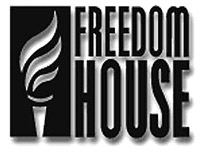Freedom House issued its annual report where Armenia ranks among the "consolidated authoritarian regimes." Democracy Suffers Dark Year in Former Communist States in 2008, runs the report Nations in Transit (NIT). Freedom House’s Annual Survey Nations in Transit (NIT) tracks democratic developments and setbacks of 29 countries in the former Communist states of Europe and Eurasia. The analysis of the experts of the Freedom House was done based on a 7-unit scale, where “7” is considered the most negative grade. Armenia received 5.39. “Armenia is a semi-authoritarian state and this result hasn’t been changed compared to the previous year. Among those countries are Armenia, Kosovo and Moldova. Semi-authoritarian counties are the ones, who are trying to disguise authoritarianism through their respect to democracy. And the election procedures in these countries don’t conform to democratic standards at all,” said the editor of the report Lisa Mutts. The 2009 report observes a worrying regional trend with more than half of the countries backsliding in democratic reforms, or continuing on a dangerous trajectory towards authoritarian governance. Being released shortly before the US-Russian Summit, Nations in Transit serves as a reminder to keep democracy issues high on the agenda in the West’s relations with Russia and its neighbors. Nations in Transit 2009 is the 13th edition of Freedom House’s comprehensive, comparative study of democratic development from Central Europe to Eurasia. It examines 29 countries, including the newest independent state in the region, Kosovo. The overarching conclusion is that 2008 was a very difficult year for democracy: scores declined for 18 of the 29 countries, and a record 8 countries are now in the "consolidated authoritarian regimes" category. Worrying trends highlighted in the previous three editions of Nations in Transit became even more pronounced in 2008, while positive trends lost momentum. A number of events illustrate the intensification of these negative trends. In 2008, for the first time in the 21st century, a war erupted between two states covered in Nations in Transit. The so-called "August War" between Georgia and Russia served as a wake-up call for those who believed that the democratic decline observed in the region over the last few years would not have a detrimental effect on security and stability. Highly problematic elections accentuated the region’s troubles. And the government in Georgia used administrative resources to seriously influence that country’s hotly contested presidential and parliamentary elections. Nations in Transit 2009 documents how journalists were once again at risk throughout the region, from Croatia to Uzbekistan, and national governments were challenged by corruption scandals, as was the case in Bulgaria; by divisive ethnic politics, as in Bosnia and Herzegovina; by parliamentary boycotts, as in Montenegro; or by infighting and outright irresponsibility among political leaders, as in Ukraine. Armenia’s presidential poll was marred by lethal post-election violence which resulted in human victims, runs the report. "Despite these drawbacks, international institutions issued positive statements about Armenian elections in 2008 that were clearly flawed. A number of positive post-election assessments by international observers are doubtful and deluding," reads the report. Director of Freedom House-Europe Vladimir Shkolnikov said during a conversation to Radio Free Europe/Radio Liberty: "Armenia is a good example. If after the large-scale election fraud, post-election collisions and the clashes of March 1-2 international observers say the Armenian elections go in line with European standards it means something is wrong." Reminder: In January report of the current year Armenia’s democracy level reached 6 and our country was considered a “partly free state.” It means that during this period Armenian registered approximately 0.5% progress, which the NA Republican faction MP Rafik Petrosyan considers “good” for us. “In January we were considered authoritarian and now we are promoted a half point,” said Petrosyan. Let us remember that the Ombudsman of Armenia Armen Harutyunyan had been stricter in his evaluation. In his annual report he named the current political system of Armenia authoritarian. The Ombudsman considered the Prosecutor’s Office and the Special Investigate Service the cornerstones of “repression.” Let us add that this time the Freedom House considered the countries with 6 grade “fully authoritarian states.” This year the number of such countries increased, by reaching 8 from 6. In this list for the first time they include Russia and Kyrgyzstan. In our country not the democracy but the government is ill. In conditions when the government feels very good in a healthy democracy there can be no progress in the health of the ill one. In this case only radical methods of changing the government can bring process. There is no other chance not to deserve such an evaluation in the future if change of government doesn’t take place. In a different environment the corrupt government will “dry out as they don’t stand the sun, they need mud.”

